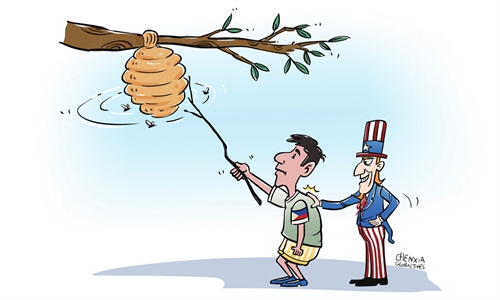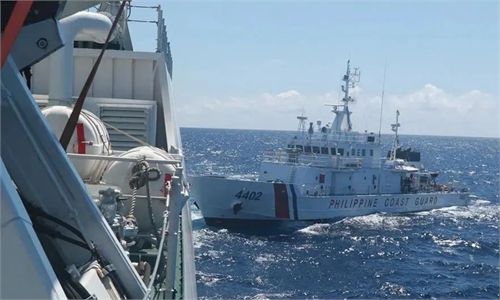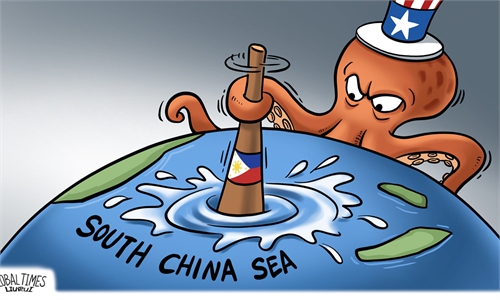Legitimate act of China in safeguarding peace, stability in South China Sea should not be defamed

Illustration: Liu Rui/GT
The statement issued by the Philippine Department of Foreign Affairs on Tuesday caught my attention. The statement was in response to reports in the country's media that China had submitted more than 10 proposals to the Philippines regarding the management of China's Ren'ai Jiao (also known as Ren'ai Reef) and related fisheries issues, but the Philippines had not responded for an extended period. The Philippine Department of Foreign Affairs admitted in the statement that they had indeed received multiple maritime proposals from China, but argued that apart from a few workable proposals, most of China's proposals ignored Philippine interests, making it impossible for the Philippines to consider them without violating the constitution or international laws such as the United Nations Convention on the Law of the Sea (UNCLOS). Philippine President Ferdinand Marcos Jr. also deliberately mentioned this matter, stating that the Philippines did not reject China's proposals on managing disputes in the South China Sea.
The Philippine Department of Foreign Affairs making a big deal out of a media report may be surprising, but the Philippines' ulterior motives are not difficult to see through. For a long time, the Philippines has been causing trouble and provocations toward China on issues related to China's Ren'ai Jiao and Huangyan Dao (also known as Huangyan Island), while internationally accusing China of "bullying the weak," and packaging itself as a "victim." The Philippine statement once again proves this point. While China has been resolutely defending its territorial sovereignty and maritime rights, it has made great efforts to handle the China-Philippines disputes and promote the cooling of the maritime situation from the perspective of bilateral relations and maintaining peace and stability in the South China Sea. This is not a secret, and it is not afraid to be known to the outside world. However, the Philippines has maliciously damaged the atmosphere of communication and cooperation between the two sides, deliberately rejecting China's goodwill.
It is understood that of the more than 10 proposals submitted by China to the Philippines, practical cooperation proposals in specific areas such as fisheries, marine environmental protection, marine scientific research, maritime search and rescue, and marine plastic waste management accounted for two-thirds, including proposals drafted by China at the request of the Philippines. These practical cooperation areas directly address the hotspots and difficulties in current regional marine governance, highly meeting the needs of countries including China and the Philippines along the South China Sea coast, reflecting China's role as the largest coastal country in the South China Sea and its goodwill in promoting cooperation in relevant areas and creating a good atmosphere for resolving maritime disputes. As for the proposals put forward by China to control the maritime situation, they adhere to the principle of gradual progress, starting from various perspectives such as improving bilateral communication mechanism on maritime issues, strengthening control in hotspots at sea, and exploring joint development in disputed waters, providing a "menu-style" cooperation option to promote consensus-building for negotiations between the two sides, fully demonstrating China's sincerity and pragmatic attitude, fundamentally not engaging in any "coercion."
The Philippine Department of Foreign Affairs claims to have convened relevant domestic departments for research, but has long been "researching without responding," "dragging without answering," and even refusing to negotiate. It should be noted that the Declaration on the Conduct of Parties in the South China Sea clearly stipulates that disputes should be peacefully resolved through negotiation and consultation. The UNCLOS also explicitly includes provisions on cooperation among coastal countries in enclosed or semi-enclosed seas, as well as obligations related to the conservation of marine resources and the protection of the marine environment. Anyone who truly respects the rule of law would not deny that resolving disputes through negotiation and consultation by the directly involved parties best reflects the voluntary will and sovereign equality of all countries, and is also a faithful practice of international law and basic principles of international relations. Anyone with a little international common sense would understand that if countries use excuses that do not conform to their own claims to create obstacles to resolving disputes, international disputes will never be resolved. Therefore, the "legal card" cannot cover up the Philippines' passive dialogue and blatant infringement.
On the one hand, the Philippines has long ignored China's proposals for practical maritime cooperation, while on the other hand, it has welcomed the interference of external countries such as the United States in the South China Sea situation. In recent years, the scale of joint maritime exercises between the US and the Philippines, including in the South China Sea, has reached new highs. From September last year to now, US-Philippines joint patrols in the South China Sea has increased fivefold. The Philippine Ambassador to the US, Jose Manuel Romualdez, even declared that the Philippines hopes for key roles from external countries such as the US, Japan, and Australia in the Philippines' resource exploration and development plans for South China Sea. Philippine President Marcos recently visited Australia and Germany, talked extensively about the South China Sea issue, and signed multiple maritime cooperation agreements. This practice of playing "double standards" and "making distant friends while attacking close ones" exposes the Philippines' ulterior motives in the South China Sea issue, which are not to resolve disputes with China through peaceful negotiations, not to promote the normalization of the South China Sea situation, but to continuously involve external forces in the South China Sea to continue to "fish in troubled waters" and achieve unilateral benefits.
As pointed out by a spokesperson for the Chinese Ministry of Foreign Affairs, "China has made proposals to the Philippines on managing the situation at sea and carrying out maritime cooperation. It fully shows China's sincerity and goodwill in standing ready to manage differences through negotiation and consultation. China's position on the South China Sea issue is consistent. We stand ready to continue to work with the Philippines to properly handle differences through dialogue and consultation. At the same time, we will take resolute measures to firmly safeguard our territorial sovereignty and maritime rights and interests." China's legitimate actions to maintain peace and stability in the South China Sea cannot be slandered, and China's determination to defend national territorial sovereignty and maritime rights cannot be underestimated. Relevant countries should face and value China's goodwill, make the necessary positive responses, control differences, engage in dialogue and communication, and explore cooperation rather than turn a deaf ear, act unilaterally, provoke trouble, and mislead the world.
The author is an observer of international affairs. opinion@globaltimes.com.cn



